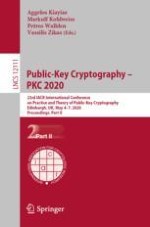Abstract
Currently, lattice-based cryptosystems are less efficient than their number-theoretic counterparts (based on RSA, discrete logarithm, etc.) in terms of key and ciphertext (signature) sizes. For adequate security the former typically needs thousands of bytes while in contrast the latter only requires at most hundreds of bytes. This significant difference has become one of the main concerns in replacing currently deployed public-key cryptosystems with lattice-based ones. Observing the inherent asymmetries in existing lattice-based cryptosystems, we propose asymmetric variants of the (module-)LWE and (module-)SIS assumptions, which yield further size-optimized KEM and signature schemes than those from standard counterparts.
Following the framework of Lindner and Peikert (CT-RSA 2011) and the Crystals-Kyber proposal (EuroS&P 2018), we propose an IND-CCA secure KEM scheme from the hardness of the asymmetric module-LWE (AMLWE), whose asymmetry is fully exploited to obtain shorter public keys and ciphertexts. To target at a 128-bit quantum security, the public key (resp., ciphertext) of our KEM only has 896 bytes (resp., 992 bytes).
Our signature scheme bears most resemblance to and improves upon the Crystals-Dilithium scheme (ToCHES 2018). By making full use of the underlying asymmetric module-LWE and module-SIS assumptions and carefully selecting the parameters, we construct an SUF-CMA secure signature scheme with shorter public keys and signatures. For a 128-bit quantum security, the public key (resp., signature) of our signature scheme only has 1312 bytes (resp., 2445 bytes).
We adapt the best known attacks and their variants to our AMLWE and AMSIS problems and conduct a comprehensive and thorough analysis of several parameter choices (aiming at different security strengths) and their impacts on the sizes, security and error probability of lattice-based cryptosystems. Our analysis demonstrates that AMLWE and AMSIS problems admit more flexible and size-efficient choices of parameters than the respective standard versions.
